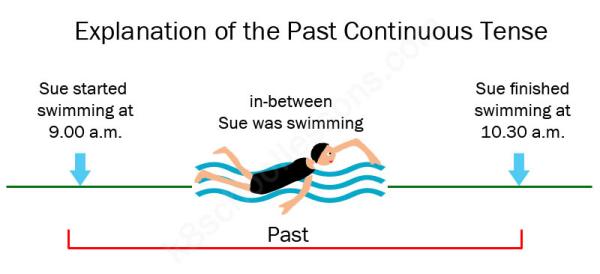We use the Past Continuous to talk about actions or events happening at a particular moment in the past – focusing on the activity in progress.



Questions in Past Continuous
To make questions in the Past Continuous, put ‘was’/’were‘ before the subject and add the ‘-ing’ form of the verb:
- What were you doing when you broke your leg?
- I was snowboarding.
Yes/No questions
To create a question that will be answered with a ‘yes’ or ‘no’, use ‘was‘ / ‘were‘ (or ‘wasn’t‘ / ‘weren’t‘ for a negative question) + -ing verb.
| Singular | Plural |
| Was I singing? Were you singing? Was he/she/it singing? | Were we singing? Were you singing? Were they singing? |
- Was it snowing yesterday at 5 o’clock?
- Were you still skating in the park when Jemma called you?
- Were the boys working in the garden when their uncle came round for a coffee?
| Note: In short positive answers to the Past Continuous questions we use only full forms of ‘was’/’were’. In short negative answers we can also use short forms of was/were. |
- – Was he playing football at that moment?
- – Yes, he was (No, he wasn’t).
- – Were they staying with their parents?
- – Yes, they were (No, they weren’t).
Special questions
Special questions (also known as wh-questions) are questions that require more information in their answers. They are made using wh- words such as what, where, when, why, which, who, how, how many, how much.
To make a special question, use the same word order as with yes-no questions but put a wh-word before the verb ‘was’ or ‘were’. The structure is:
wh-word + was/were + [subject] + -ing verb
- What was she thinking about last night? She looked worried.
- What music were they listening to?
- Why were they drinking champagne yesterday?
Negative forms of Past Continuous
To make negative statements in the Past Continuous, we use:
was/were + not + the “-ing” form of the verb
| Singular | Plural |
| I was not (wasn’t) talking You were not talking He/she/it was not talking | We were not (weren’t) talking You (weren’t) talking They (weren’t) talking |
- Peter wasn’t doing his homework when his father came in.
- Rebecca was angry with her children because they weren’tsleeping when she arrived.
Check out this video from Ustazy to summarize different forms of Past Continuous tense:
See also: